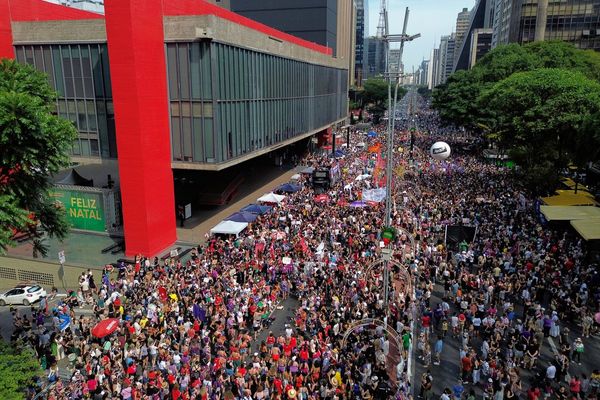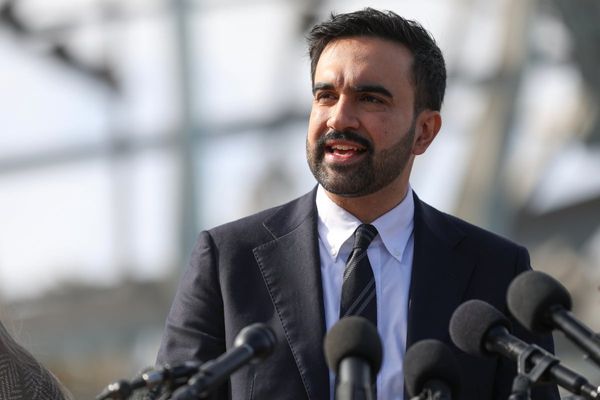
Benjamin Netanyahu is “in denial” over the humanitarian crisis in Gaza, Anthony Albanese claimed after a phone call with the Israeli leader, saying frustration with Israel’s military campaign in the besieged territory was part of Australia’s decision to recognise a Palestinian state.
The prime minister’s escalating public criticism of Israel comes as the French president, Emmanuel Macron, overnight welcomed Australia’s commitment to recognise Palestinian statehood at the UN general assembly in September.
“I spoke with Prime Minister Netanyahu. He, again, reiterated to me what he has said publicly as well – which is to be in denial about the consequences that are occurring for innocent people,” Albanese told ABC TV.
Albanese yesterday said Australia’s pledge to recognise a Palestinian state was “predicated” on conditions agreed to by the Palestinian Authority, which included no role for terror group Hamas in a future government. The prime minister said the international community could block Hamas from standing in future elections in Palestine, but refused to say whether Australia would revoke its plans to recognise if such conditions were not met.
Sign up: AU Breaking News email
“You can [stop Hamas from standing in elections] if you have the Arab states in the Middle East all speaking as one, as well as the Palestinian Authority, as well as the international community. Yes, you can,” he told Nine.
In a press conference, Albanese went on to say that violence in the region, including Israel’s planned military occupation of Gaza City, “just cannot continue into the future without an end point”.
“The international community is coming up with an end point, which is, how do we resolve this? How do we get a permanent security position?” he said.
Macron, who declared in July that France would recognise Palestinian statehood at the General Assembly, said Australia was “joining the momentum” of a global push toward resolving the crisis in Gaza.
“This reflects our commitment to the two-state solution and to the need to collectively rebuild a political pathway, without which there can be no peace and security for all,” he wrote.
There are a raft of unanswered questions including how the Palestinian state would be formed, how it would be demilitarised and where Australia would establish an embassy. Albanese and the foreign affairs minister, Penny Wong, shrugged off repeated questions in media interviews on Monday and Tuesday about how Australia would respond if the Palestinian Authority’s commitments were not met, or if they would reverse their recognition pledge.
“What we will also do is work with the international community to hold the Palestinian Authority to its commitments,” Wong told the ABC’s 7.30 program on Monday night.
The Coalition opposition is critical of the Labor government’s decision, claiming it rewards Hamas, and that the government has failed to answer outstanding questions.
The opposition leader, Sussan Ley, said on Tuesday a future Coalition government would revoke Palestinian recognition, raising questions about how such a diplomatic backflip could be executed three or six years into the future of a newly established Palestine.
The Coalition opposed Monday’s decision from the Labor government, claiming Palestinian recognition was a reward for Hamas. Ley said in a statement that the Coalition’s shadow cabinet resolved to oppose a Palestinian state and also “resolved that recognition would be revoked by a Coalition government”.
The Coalition will remain in opposition until at least 2028, and potentially longer. Ley’s statement did not go into how Australia would diplomatically untangle recognition of a Palestinian state, three or six years down the track, or how un-recognising a Palestinian state would help contribute to the peace process between Israel and Palestine, or assist broader cohesion in the Middle East.
The former Liberal prime minister Scott Morrison claimed Jewish Australians would feel a “sense of betrayal” at the government’s shift.
“It will prove a hollow gesture, like for all those who have taken this step before it,” Morrison wrote on his website. “None should take any comfort in it. Meanwhile the suffering will regrettably continue in Gaza and the hostages will remain in captivity.”
Israel’s government has been deeply critical of Albanese’s decision, and also said Labor is rewarding Hamas.
In a statement on X, Israel’s deputy minister of foreign affairs, Sharren Haskel, said the move was about domestic politics, not peace.
“Fifty of our hostages remain in Hamas’s dungeons of torture, being starved to death – being forced to dig their own graves – yet the Australian government has decided now is the right time to reward the monsters of October 7 with recognition of a Palestinian state,” she wrote.
“This decision by Australia won’t change anything in Israel or Gaza, but let’s be quite clear, this is all about domestic politics, not peace.”







